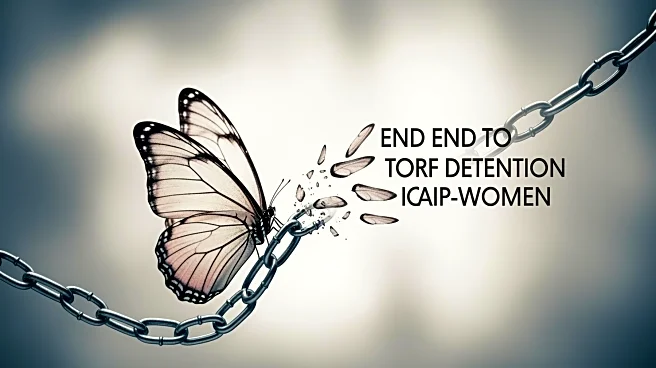What's Happening?
An immigrant rights group has called on the Trump administration to stop detaining pregnant women in federal immigration custody facilities, citing inadequate care. The group, along with Democrats, has raised
concerns about the treatment of pregnant detainees, who report being shackled during transport, placed in solitary confinement, and denied adequate food and water in facilities located in Louisiana and Georgia. The Department of Homeland Security defends its care as meeting community standards, providing regular prenatal visits, mental health services, and nutritional support. However, the agency has not disclosed the number of pregnant women currently held in detention. The American Civil Liberties Union has documented cases of pregnant women experiencing neglect, including miscarriages and severe infections, while in custody.
Why It's Important?
The detention of pregnant women in immigration facilities raises significant human rights concerns and highlights the ongoing debate over immigration policies in the United States. The reported mistreatment of pregnant detainees could have serious health implications for both the mothers and their unborn children. This issue also underscores the broader challenges faced by immigrant populations in accessing adequate healthcare and humane treatment. The call for policy changes reflects growing pressure on the government to address these concerns and ensure that vulnerable populations receive appropriate care. The situation may influence public opinion and policy discussions regarding immigration enforcement and detention practices.
What's Next?
Legislative efforts are underway to address the treatment of pregnant women in federal custody. Representative Sydney Kamlager-Dove is working on legislation to severely restrict the use of restraints on pregnant, laboring, and postpartum women in federal custody. Senate Democrats have also expressed concerns and demanded that the Department of Homeland Security stop detaining pregnant, postpartum, and nursing women unless there are exceptional circumstances. These initiatives may lead to changes in detention policies and practices, potentially improving conditions for pregnant detainees. The ongoing advocacy and legislative efforts could result in increased oversight and accountability within immigration enforcement agencies.
Beyond the Headlines
The issue of detaining pregnant women in immigration facilities touches on broader ethical and legal dimensions, including the rights of detainees to receive adequate healthcare and humane treatment. It raises questions about the balance between immigration enforcement and the protection of vulnerable populations. The situation may also prompt discussions about the role of government in ensuring the welfare of all individuals, regardless of their immigration status. Long-term shifts in policy could emerge from this debate, potentially influencing how immigration laws are enforced and how detainees are treated in the future.








